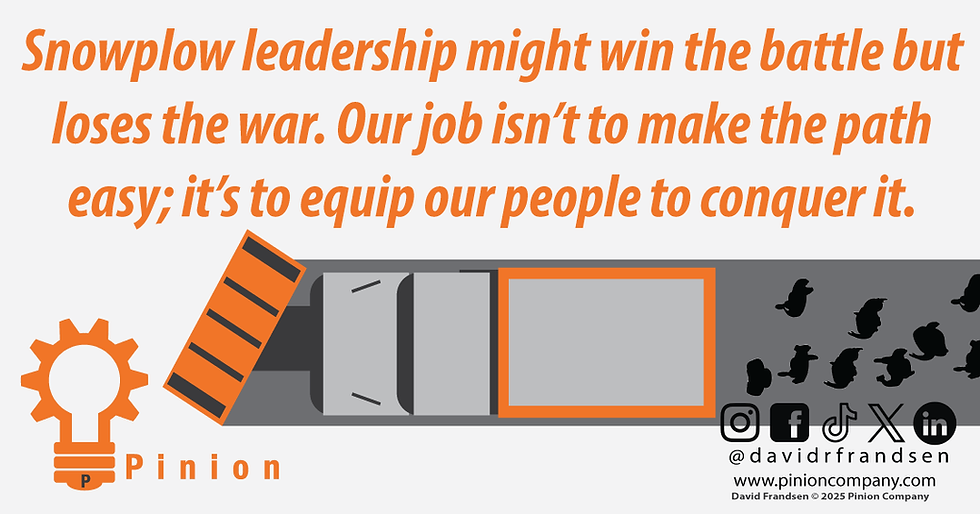Freedom Through Self-Discipline: How Systems Power Progress and Unlock Real Workplace Freedom
- David Frandsen
- Sep 1, 2025
- 3 min read

When most people hear “discipline,” they think of restriction. But I’ve found the opposite to be true, both in my personal routines and, especially, at work. Discipline isn’t about getting boxed in—it’s the foundation for true freedom. Aristotle said it best, “Through discipline comes freedom”. By building systems and habits, we reclaim energy, reduce stress, and move ourselves and our organizations forward with clarity and purpose.
Why Self-Discipline Sets You Free
I’ve experienced it firsthand and written about it at pinioncompany.com: setting up disciplined routines—whether for daily workouts or work tasks—means I’m not constantly wrestling with decisions. The time and energy I’d waste on “what now?” gets shifted to more meaningful work. When you know what needs to be done and when, you’re not bogged down by constant micro-decisions or the stress of catching up.
Systems: The Underappreciated Shortcut to Consistency
Building strong systems at work—think daily checklists, templated processes, or team rituals—is how we operationalize discipline. When the ground rules are clear, decision-making becomes faster and less stressful. Over time, this consistency creates predictability and frees up mental space for solving real problems and innovating. I’ve highlighted in my articles how these systems aren’t rigid; they give us structure so we can adapt and move faster when unexpected challenges hit. That’s the paradox: real flexibility is only possible when you’re grounded by dependable systems.
Touching on the Planetary Gear Model
I often describe our organizational approach with my “planetary gear” framework. Here, people are the sun gear at the center—our real power source. Surrounding that are other crucial “gears”: culture, performance, environment, and leadership. When these gears are meshed smoothly by strong systems and self-discipline, the whole organization moves efficiently and purposefully.
These gears aren’t just metaphors. For example, our recognition systems (to highlight both the visible and invisible “bummock” work) and our leadership programs are tangible ways discipline supports the gears and drives us all forward. But my main point is this: when we build habits and support structures with intention, like a well-designed gear system, we create fewer stressful bottlenecks, allow ourselves freedom to focus on what truly matters, and make success repeatable.
Real-World Benefits: Less Stress, More Progress
With disciplined systems:
Decision fatigue drops: More energy for creative and strategic work.
Forward momentum builds: Predictable progress replaces anxiety and stalling.
Teams thrive: Everyone knows their role, expectations, and how to succeed.
True freedom emerges: Not because everything is decided for you, but because the important stuff is handled—giving you space to grow and innovate.
When I see well run organizations, I see the value of combining discipline and structure (as I illustrate with the planetary gear analogy) with a consistent, systems-based approach. In the end, freedom at work isn’t the absence of rules; it’s having the right systems in place so you and your team can focus on what really moves the needle, feeling less stress and more purpose every day.
By weaving disciplined systems into our organizations, we unlock a culture where everyone is equipped to move forward—together, with less friction and more freedom. That’s not just business theory. That’s been my lived experience and the heart of the Pinion approach.
#GearUpForSuccess, #GearUp, #GearUpYourOrganization, #LeadershipDevelopment, #Leadership, #LeadershipSkills, #LeadershipTraining, #ProfessionalDevelopment, #LeadershipCoaching, #PersonalGrowth, #CareerDevelopment, #LeadershipQuotes, #LeadershipGoals, #Coaching, #Entrepreneurship, #Mindset, #Success, #PersonalDevelopment, #BusinessStrategy, #ProfessionalGrowth, #LeadershipMatters, #LeadershipLessons, #Empowerment




Comments